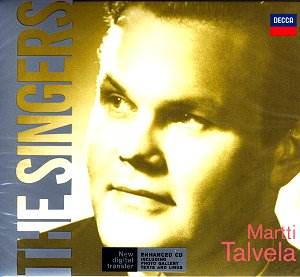This disc is one of the first twenty of Decca's ‘The
Singers’ series. With another thirty in preparation, this series
claims to present the artistry of the greatest singers from the first
century of recording. The selection of singer and tracks was made by
the late John Ardoin and is somewhat idiosyncratic despite the overflowing
recorded annals of DG, Philips and Decca.
These discs include a ‘multimedia’ element, being enhanced
for those with CD-ROM facility, to include photo gallery, biographies
and texts. If you lack a suitable PC you have to make do with a brief
essay and track listing, the latter omitting such basic information
as to the operatic character singing the aria! The presentation aims
to be different and unique, being a cardboard case within a plastic
slip case emblazoned ‘The Singers’
Born in Finland in 1935, Marti Talvela sang
in all the world’s major opera houses. A big man, he is most often remembered
for his performances in opera. He was a noble Boris, Old Believer (Khovanshchina),
Sarastro and King Philip. However, he gave many recitals of lieder and
song and it is this aspect of his art that is represented on this disc.
When recorded in 1969, Schumann’s opus 35 was a neglected work, being
a series of 12 song settings for various vocal registers rather than
a cycle as presented here. Talvela is not successful in fining down
his large bass voice for the soprano song, Stille Tränen
for example (tk 10), and expression is lost: whilst Wanderlied
(tk 3) is better suited and allows him to exhibit his wide ranging artistry
and vocal prowess. Mussorgsky’s Flea and Songs and Dances
of Death, and the four Rachmaninov songs, recorded in 1980, are
more Talvela’s métier. He has an obvious affinity for the Russian
language and its nuances, and all these songs are well suited to his
strengths, be it in vocal heft or delicate shading of expression and
phrasing. Both accompanists are first rate.
The recordings are well balanced between piano and
singer in a clear natural acoustic. The booklet essay by John Steane,
the doyen of commentators of the singing voice, is exemplary.


